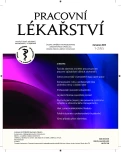-
Medical journals
- Career
Compensation exercise in patients with occupational lesion of ulnar nerve in the elbow region
Authors: Máslová Veronika 1; Nakládalová Marie 2; Marečková Jana 1
Authors‘ workplace: Fakulta zdravotnických věd UP v Olomouci, doktorský studijní program Ošetřovatelství, předseda oborové rady doc. PhDr. Jana Marečková, Ph. D. 1; Klinika pracovního lékařství Lékařské fakulty Univerzity Palackého v Olomouci, přednostka doc. MUDr. Marie Nakládalová, Ph. D. 2
Published in: Pracov. Lék., 65, 2013, No. 1-2, s. 19-24.
Category: Original Papers
*Sdělení vychází z diplomové práce studentky navazujícího magisterského programu fyzioterapie FZV UP v Olomouci.
Overview
Introduction:
Ulnar nerve lesion in the elbow region is the second most frequent occupational damage of peripheral nerves and all possibilities of therapy and prevention of the damage are therefore important.Objective:
The paper presents various kinds of compensation exercise suitable for patients with ulnar nerve lesion in the elbow region and verifies their efficiency.Group and methods:
The group encompassed 15 persons, who had been acknowledged to suffer from ulnar nerve lesion in the elbow region, which became manifest in the observed group in 22 extremities. There were 9 men and 6 women in the group at the age of 33 to 64 years. Their mean age was 49.6 years (S.D. 10.8) and they suffered from long-term complaints for the period of three to 15 years, 8.1 years on the average (S.D. 3.6). Patients who gave consent to participate in the research, filled out, with the help of a physiotherapist, an anamnesis questionnaire which was oriented to incidence of complaints, their intensity and duration. They were explained five simple kinds of exercise to be performed twice daily for the period of three months. Following this time period of self-reliant exercise the patients were again asked to report the incidence and severity of the symptoms and paresthesia, nocturnal pains, decreased sense of touch, feelings of cold extremities and decrease muscular strength were evaluated,Results:
The patients reported 86 symptoms on the affected extremities before the exercise, while diminution of the symptoms occurred after the exercise. The improvement concerned all modalities, but the most significant improvement was reach with nocturnal pains and paresthesia.Conclusion:
The authors are of the opinion that compensation exercise is a suitable component of conservative treatment as well as an obliged component on prevention in persons, who work at the risk of origination of this kind of damage. Education of the clients should be entrusted to physiotherapists, ergotherapists, but it could be also performed by general nurses working at the occupational medicine wards at institutions providing occupational medical services.Keywords:
occupational disease – ulnar nerve lesions in the elbow region – neurodynamic nerve mobilization – compensation exercise
Sources
1. AMERICAN ACADEMY OF ORTHOPAEDICS SURGEON Ulnar Nerve Entrapment at the Elbow (Cubital Tunnel Syndrome). Online [cit. 200l-03-23]. Dostupný z www: http://orthoinfo.aaos.org/topic.cfm?topic=A00069.
2. Bozentka, D. J. Cubital tunnel syndrome pathophysiology. Clinical Orthopaedics and related research, 1998, 351, s. 90–94.
3. Coppieters, M. W. et al. Incorporating nerve-gliding technique in the konservative treatment of cubital tunnel syndrome. Journal of manipulative and physiological therapeutics, 2004, 27, 9, s. 560–569.
4. Ehler, E., Latta, J. Kompresivní neuropatie loketního nervu. České pracovní lékařství, 2009, 2, s. 77–80.
5. Chin, D. H., Jones, N. F. Repetitive motion hand disorders. Journal of California dental association. 2002, 30, 2, s. 149–160.
6. Lund, A. T., Amadio, P. C. Treatment of Cubital Tunnel Syndrome: Perspectives for the Therapist. Journal of Hand Therapy, 2006, s. 170–179.
7. Nakamichi, K. et al. Pacient education for treatment of ulnar neuropathy at the Elbow. American Journal of Physical Medicine and Rehabilitation, 2009, 90, 11, s. 1839–1845.
8. Oskay, D. et al. Neurodynamic mobilization in the conservative treatment of cubital tunnel syndrome: long-term follow-up of 7 cases. Journal of manipulative and physiological therapeutics, 2010, 33, 2, s. 156–163.
9. Stewart, J. D. The variable clinical manifestations of ulnar neuropathies at the elbow. Journal of Neurology, Neurosurgery and Psychiatry, 1987, 50, s. 252–258.
10. Vodvářka, T. Úžinové syndromy. Interní medicína pro praxi, 2005, 2, s. 74–80.
Labels
Hygiene and epidemiology Hyperbaric medicine Occupational medicine
Article was published inOccupational Medicine

2013 Issue 1-2-
All articles in this issue
- Criteria for evaluating working physical fitness of mine rescuers
- Health of employees at the open space offices
- Compensation exercise in patients with occupational lesion of ulnar nerve in the elbow region
- Quality of life in patients with vertigo
- Research into motivation for compensating hearing defect
- Occupational injuries of medical personnel
- Does liver fibrosis represent a reversible process?
- Psychohygiene (not only) as prevention of the burn-out syndrome in medical management
- Noise from the occupational medical point of view
- Focal dystonia in professional musicians
- Development of a case of pulmonary aluminosis
- Occupational Medicine
- Journal archive
- Current issue
- Online only
- About the journal
Most read in this issue- Compensation exercise in patients with occupational lesion of ulnar nerve in the elbow region
- Focal dystonia in professional musicians
- Psychohygiene (not only) as prevention of the burn-out syndrome in medical management
- Does liver fibrosis represent a reversible process?
Login#ADS_BOTTOM_SCRIPTS#Forgotten passwordEnter the email address that you registered with. We will send you instructions on how to set a new password.
- Career

